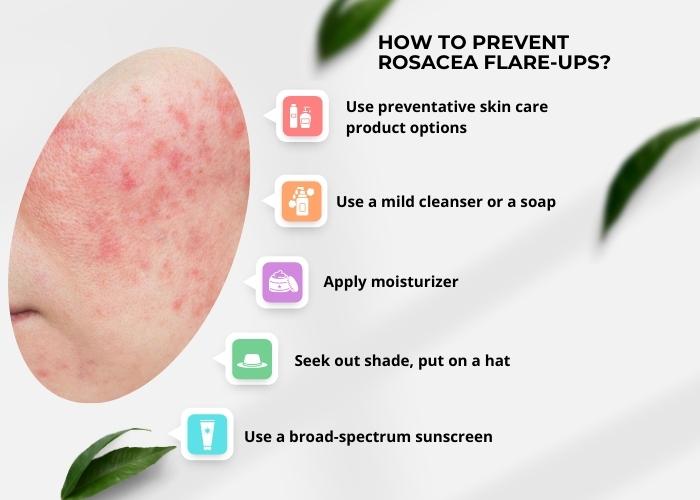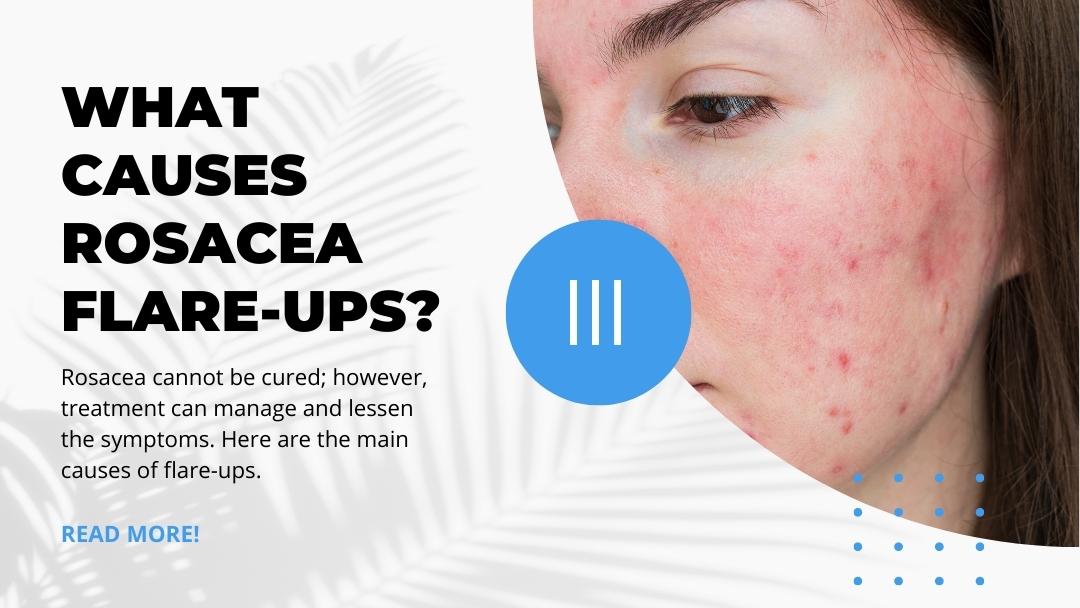Rosacea is a common disorder causing skin to appear flushed with visible blood vessels. Additionally, it may result in tiny, pus-filled pimples. It is often confused with acne, other skin conditions, or ruddiness that occurs naturally. These symptoms and signs may fluctuate for weeks or months before subsiding temporarily.
Rosacea cannot be cured; however, treatment can manage and lessen the symptoms. Anyone can develop rosacea, but women in their middle age have it most frequently.
What Causes Rosacea Flare-Ups?
If you suffer from Rosacea, knowing what causes flare-ups is important. This will allow you to manage symptoms, and prevent it from worsening.
Although triggers may vary, some of the most common causes includes the following:
- Sun exposure – The most typical rosacea trigger is sun exposure. When the UV index is high, people with rosacea should take special care to prevent direct sun exposure on their faces by using sunscreen every day, wearing a wide-brimmed hat, and remaining inside or in the shade;
- Demodex folliculorum, a mite that is typically found on everyone’s nose and cheeks, may be overabundant or induce hypersensitivity in some individuals. According to studies, numerous rosacea sufferers have been shown to carry these mites, but is still under investigation as to whether it promotes Rosacea flare-ups;
- Helicobacter pylori, a type of bacteria has been confirmed to increase your risk of developing rosacea. According to research, this bacteria triggers the immune system to produce huge amounts of inflammatory mediators that can result in Rosacea flare-ups;
- Certain foods such as dairy products, citrus fruits, chocolate, vinegar, soy sauce, beans and spicy foods.
- Beverages such as red wine, beer, gin, vodka, hot drinks (such as tea or coffee) and sparkling wines are also said to trigger flare-ups on some people.
- Medical Conditions such as chronic cough, menopause, and caffeine withdrawal can also cause your Rosacea to flare-ups.
- Other causes include stress, anxiety, medications, exercise, and strenuous activities.

How to Prevent Rosacea Flare-Ups?
Now that you know the causes of Rosacea flare-ups, the next important point is how to prevent it. Below are some of the ways to prevent or at least minimize the occurrence of Rosacea.
- Use skin care products that are gentle, fragrance- and alcohol-free.
- Use a mild cleanser or a soap replacement to gently wash your face, then pat the skin dry. Abrasive cleaning and rubbing should be avoided because they can irritate the skin.
- Apply moisturizer; choose one that is “oil-free,” “fragrance-free,” and “non-comedogenic.” Regularly moisturize your face to help avoid dryness and irritation.
- Seek out shade, put on a hat with a wide brim, wear sunglasses, and stay out of the midday sun.
- It is strongly recommended to use a broad-spectrum sunscreen with at least SPF 30 before exposure to outdoor elements.
How to Cure Rosacea?
Although Rosacea cannot be cured permanently, it is important to get treatment as soon as possible since the condition worsens over time. For those who suffer from minor symptoms, dermatologist prescribed outpatient therapy is the most common treatment method.
At Associated Dermatologists, we’ve had success using several methods to reduce the signs of Rosacea. When treating your rosacea, we work closely with you to look into every treatment option.

We’ll assist you in identifying your Rosacea triggers and we’ll develop a strategy to prevent them. For most people, the most effective strategy to lessen flare-ups is to apply sunscreen every day, especially when going out since sufferers are sun-sensitive.
What is The Permanent Solution for Rosacea Flare-Up?
Unfortunately, Rosacea cannot be cured; however, there are methods to lessen its recurrence in addition to treatments available. Identifying the causes of your flare-up will greatly influence how effective the strategy will be. The most important thing to remember is to avoid sunlight, heat, or other severe temperatures.
Also, as discussed above wind, exercise, caffeine, spicy foods, stress, alcohol, prescription drugs like steroids, or other irritating topical items are all potential Rosacea causes. Some experimenting may be needed to find out what actually causes flare-ups. Once you’ve identified the triggers, it’s important to avoid those that make your Rosacea worse.
Thank you for reading! If you’re near the Birmingham area and you’d like to schedule an appointment to discuss your Rosacea, reach out to our office at (205) 853-3960 today.

